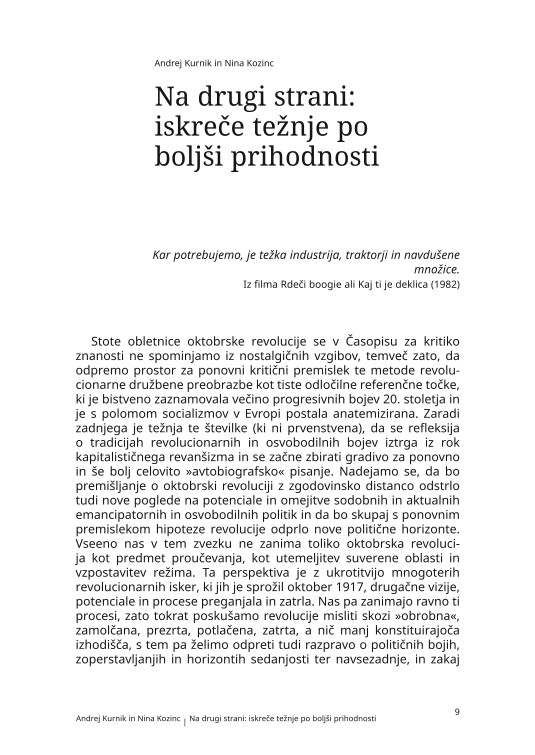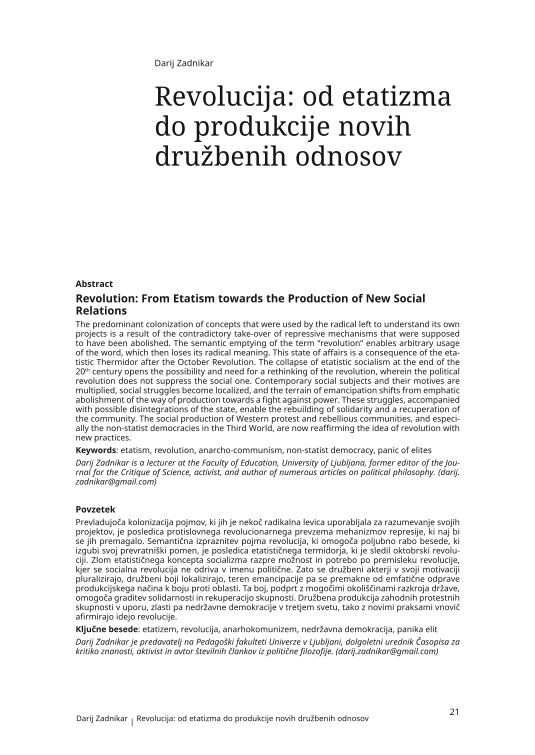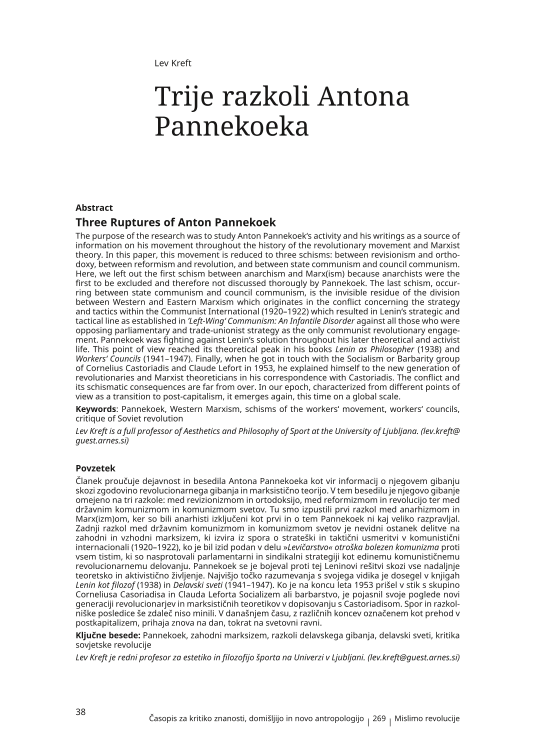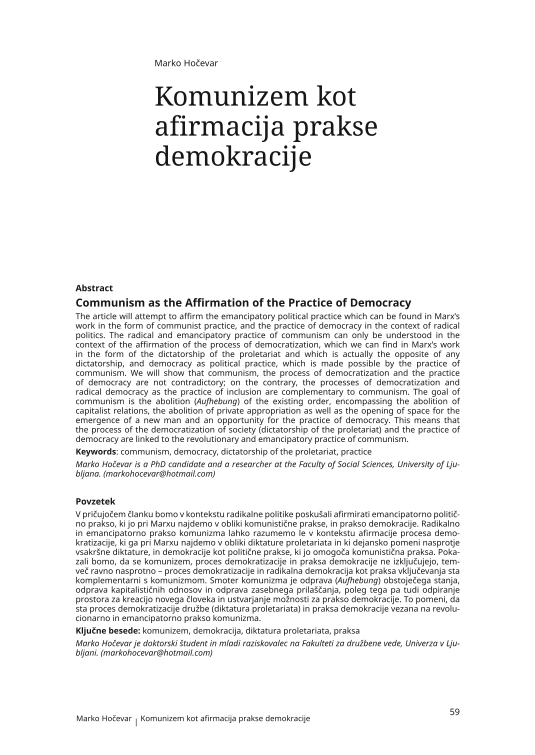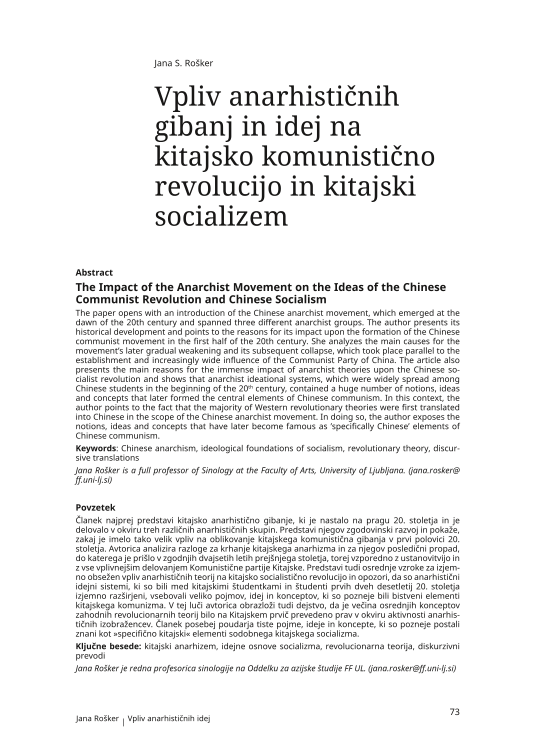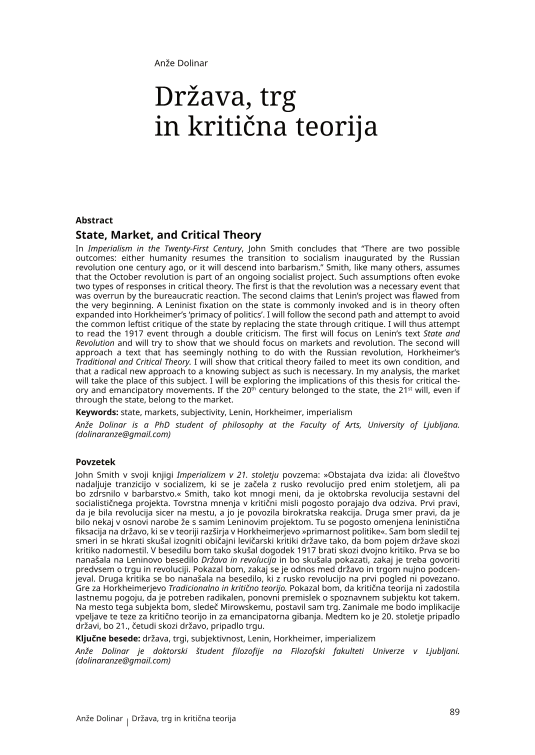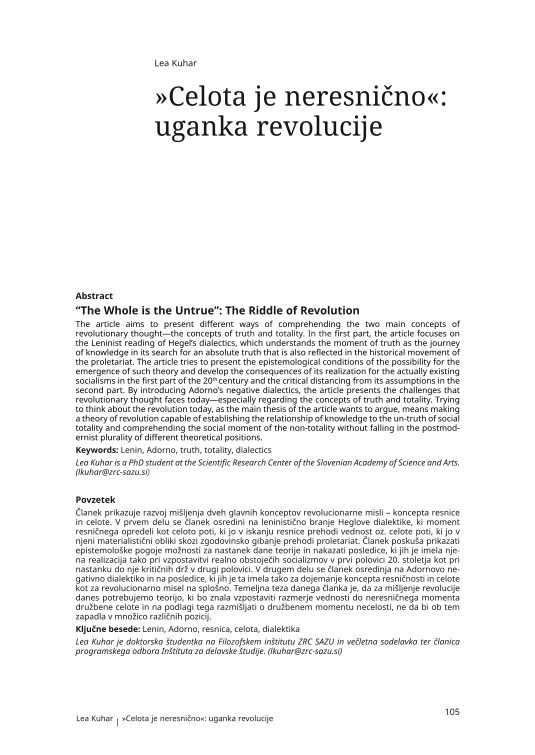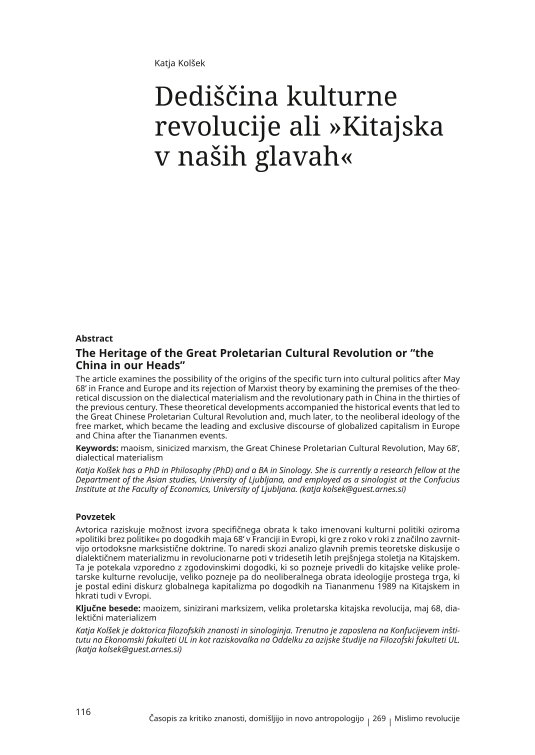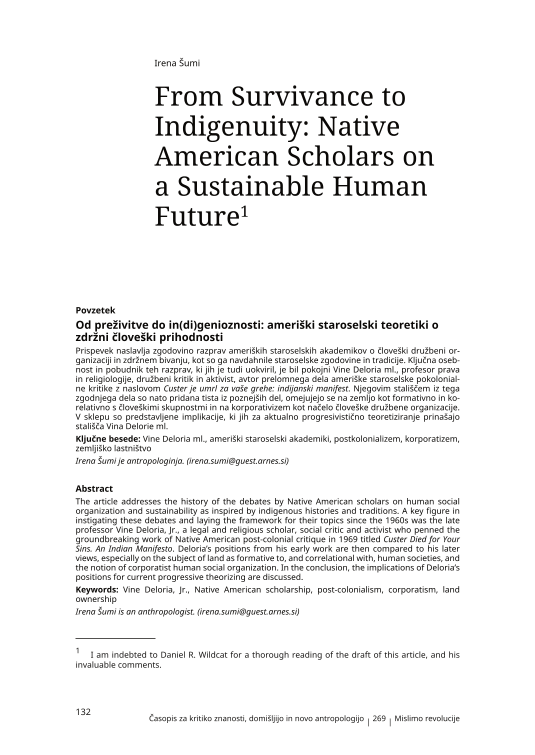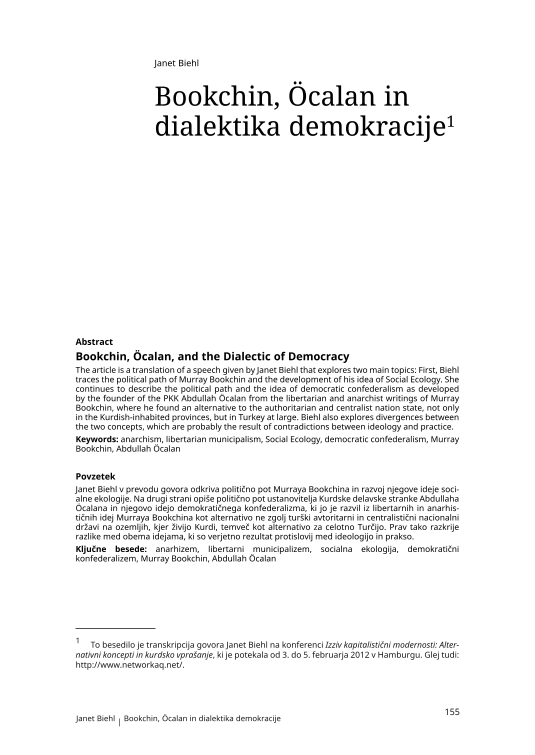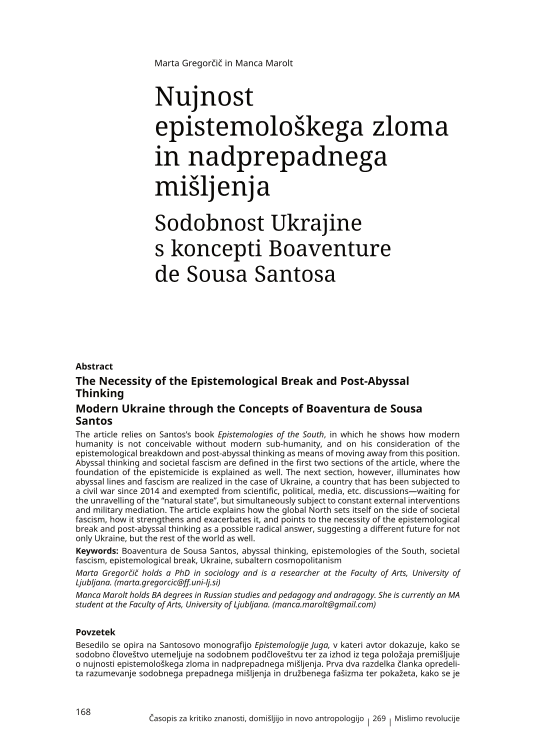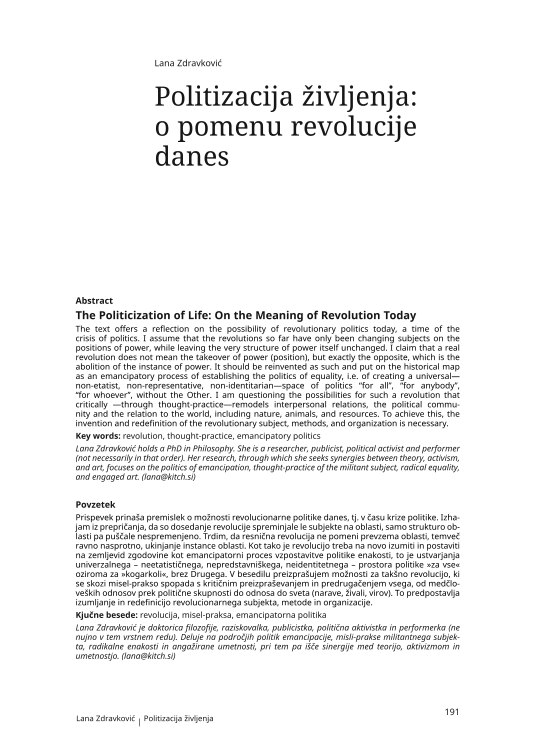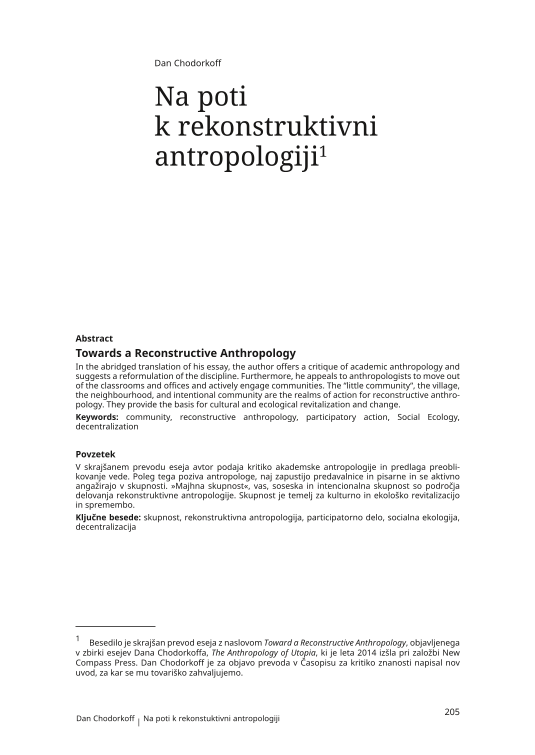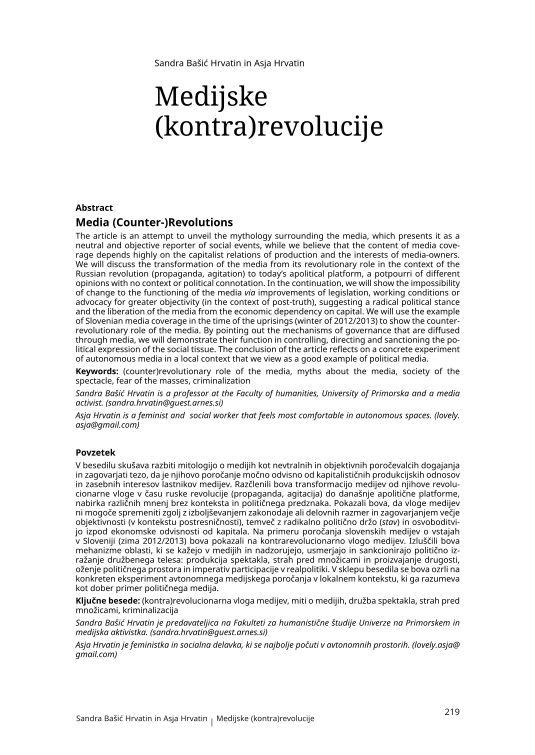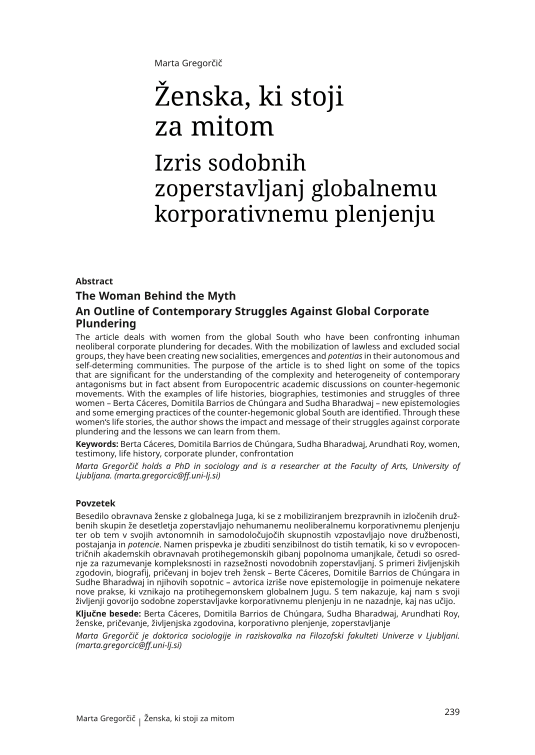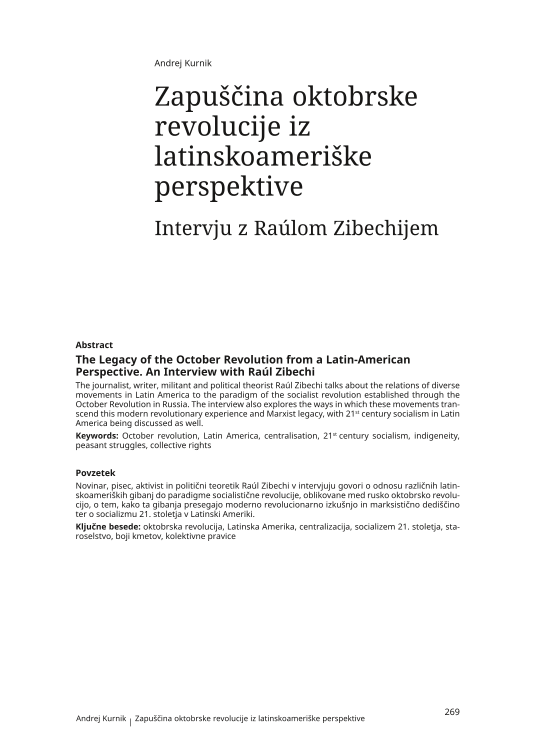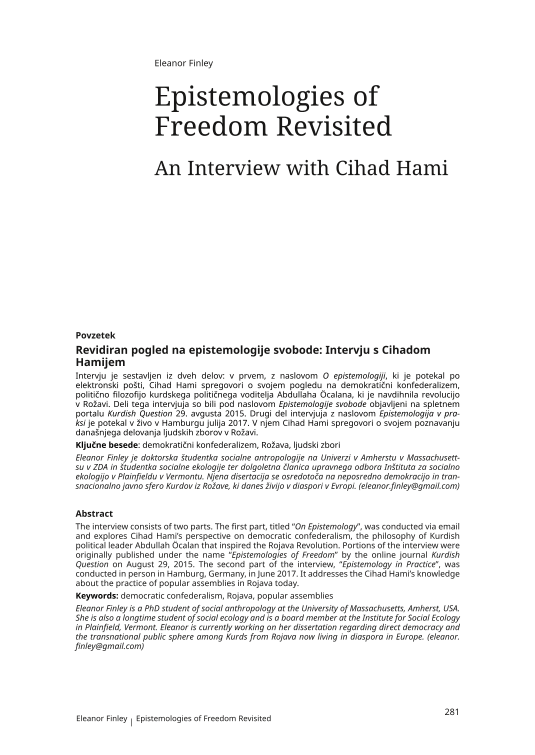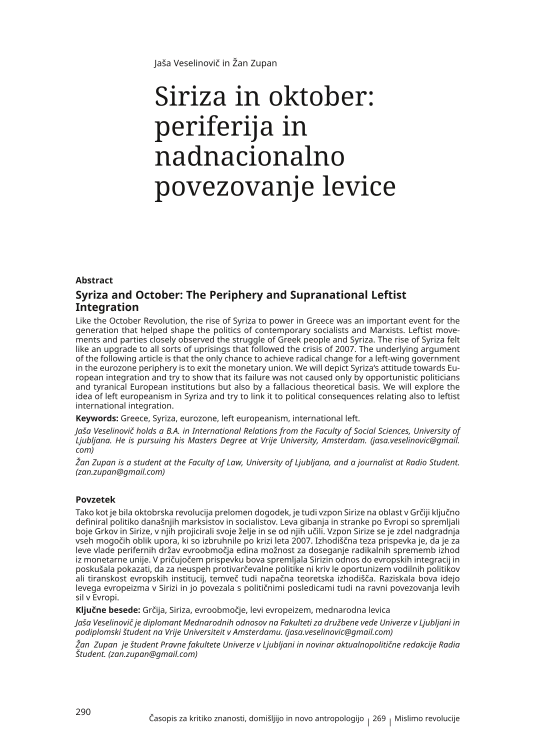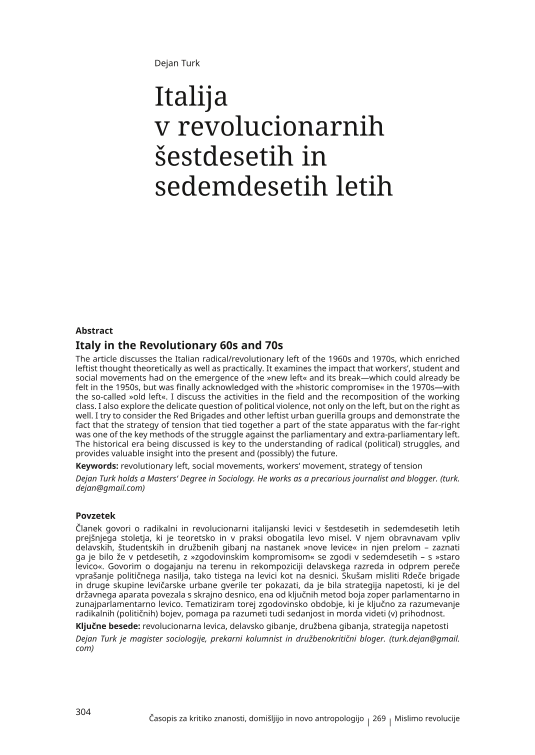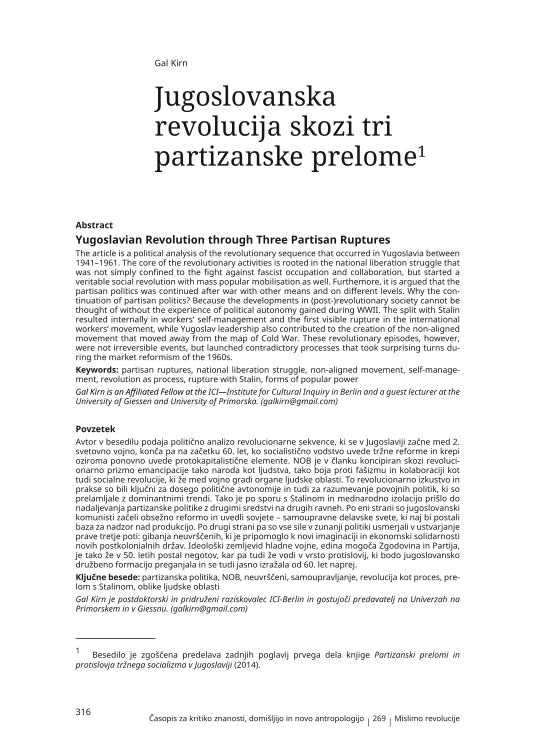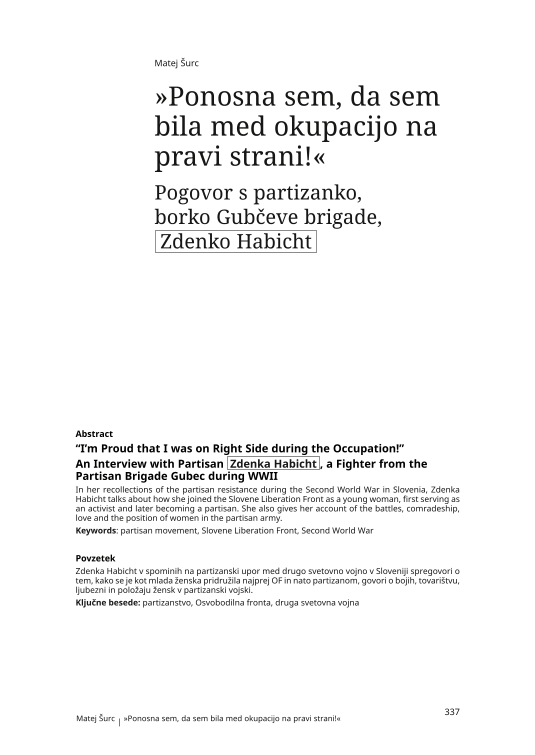Stote obletnice oktobrske revolucije se v Časopisu za kritiko znanosti ne spominjamo iz nostalgičnih vzgibov, temveč zato, da odpremo prostor za ponovni kritični premislek te metode revolucionarne družbene preobrazbe kot tiste odločilne referenčne točke, ki je bistveno zaznamovala večino progresivnih bojev 20. stoletja in je s polomom socializmov v Evropi postala anatemizirana. Zaradi zadnjega je težnja te številke (ki ni prvenstvena), da se refleksija o tradicijah revolucionarnih in osvobodilnih bojev iztrga iz rok kapitalističnega revanšizma in se začne zbirati gradivo za ponovno in še bolj celovito »avtobiografsko« pisanje. Nadejamo se, da bo premišljanje o oktobrski revoluciji z zgodovinsko distanco odstrlo tudi nove poglede na potenciale in omejitve sodobnih in aktualnih emancipatornih in osvobodilnih politik in da bo skupaj s ponovnim premislekom hipoteze revolucije odprlo nove politične horizonte. Vseeno nas v tem zvezku ne zanima toliko oktobrska revolucija kot predmet proučevanja, kot utemeljitev suverene oblasti in vzpostavitev režima. Ta perspektiva je z ukrotitvijo mnogoterih revolucionarnih isker, ki jih je sprožil oktober 1917, drugačne vizije, potenciale in procese preganjala in zatrla. Nas pa zanimajo ravno ti procesi, zato tokrat poskušamo revolucije misliti skozi »obrobna«, zamolčana, prezrta, potlačena, zatrta, a nič manj konstituirajoča izhodišča, s tem pa želimo odpreti tudi razpravo o političnih bojih, zoperstavljanjih in horizontih sedanjosti ter navsezadnje, in zakaj ne, o možnostih današnjega radikalnega preloma.
The predominant colonization of concepts that were used by the radical left to understand its own projects is a result of the contradictory take-over of repressive mechanisms that were supposed to have been abolished. The semantic emptying of the term “revolution” enables arbitrary usage of the word, which then loses its radical meaning. This state of affairs is a consequence of the etatistic Thermidor after the October Revolution. The collapse of etatistic socialism at the end of the 20th century opens the possibility and need for a rethinking of the revolution, wherein the political revolution does not suppress the social one. Contemporary social subjects and their motives are multiplied, social struggles become localized, and the terrain of emancipation shifts from emphatic abolishment of the way of production towards a fight against power. These struggles, accompanied with possible disintegrations of the state, enable the rebuilding of solidarity and a recuperation of the community. The social production of Western protest and rebellious communities, and especially the non-statist democracies in the Third World, are now reaffirming the idea of revolution with new practices.
Članek proučuje dejavnost in besedila Antona Pannekoeka kot vir informacij o njegovem gibanju skozi zgodovino revolucionarnega gibanja in marksistično teorijo. V tem besedilu je njegovo gibanje omejeno na tri razkole: med revizionizmom in ortodoksijo, med reformizmom in revolucijo ter med državnim komunizmom in komunizmom svetov. Tu smo izpustili prvi razkol med anarhizmom in Marx(izm)om, ker so bili anarhisti izključeni kot prvi in o tem Pannekoek ni kaj veliko razpravljal. Zadnji razkol med državnim komunizmom in komunizmom svetov je nevidni ostanek delitve na zahodni in vzhodni marksizem, ki izvira iz spora o strateški in taktični usmeritvi v komunistični internacionali (1920–1922), ko je bil izid podan v delu »Levičarstvo« otroška bolezen komunizma proti vsem tistim, ki so nasprotovali parlamentarni in sindikalni strategiji kot edinemu komunističnemu revolucionarnemu delovanju. Pannekoek se je bojeval proti tej Leninovi rešitvi skozi vse nadaljnje teoretsko in aktivistično življenje. Najvišjo točko razumevanja s svojega vidika je dosegel v knjigah Lenin kot filozof (1938) in Delavski sveti (1941–1947). Ko je na koncu leta 1953 prišel v stik s skupino Corneliusa Casoriadisa in Clauda Leforta Socializem ali barbarstvo, je pojasnil svoje poglede novi generaciji revolucionarjev in marksističnih teoretikov v dopisovanju s Castoriadisom. Spor in razkolniške posledice še zdaleč niso minili. V današnjem času, z različnih koncev označenem kot prehod v postkapitalizem, prihaja znova na dan, tokrat na svetovni ravni.
The article will attempt to affirm the emancipatory political practice which can be found in Marx’s work in the form of communist practice, and the practice of democracy in the context of radical politics. The radical and emancipatory practice of communism can only be understood in the context of the affirmation of the process of democratization, which we can find in Marx’s work in the form of the dictatorship of the proletariat and which is actually the opposite of any dictatorship, and democracy as political practice, which is made possible by the practice of communism. We will show that communism, the process of democratization and the practice of democracy are not contradictory; on the contrary, the processes of democratization and radical democracy as the practice of inclusion are complementary to communism. The goal of communism is the abolition (Aufhebung) of the existing order, encompassing the abolition of capitalist relations, the abolition of private appropriation as well as the opening of space for the emergence of a new man and an opportunity for the practice of democracy. This means that the process of the democratization of society (dictatorship of the proletariat) and the practice of democracy are linked to the revolutionary and emancipatory practice of communism.
The Impact of the Anarchist Movement on the Ideas of the Chinese Communist Revolution and Chinese Socialism
(
The paper opens with an introduction of the Chinese anarchist movement, which emerged at the dawn of the 20th century and spanned three different anarchist groups. The author presents its historical development and points to the reasons for its impact upon the formation of the Chinese communist movement in the first half of the 20th century. She analyzes the main causes for the movement’s later gradual weakening and its subsequent collapse, which took place parallel to the establishment and increasingly wide influence of the Communist Party of China. The article also presents the main reasons for the immense impact of anarchist theories upon the Chinese socialist revolution and shows that anarchist ideational systems, which were widely spread among Chinese students in the beginning of the 20th century, contained a huge number of notions, ideas and concepts that later formed the central elements of Chinese communism. In this context, the author points to the fact that the majority of Western revolutionary theories were first translated into Chinese in the scope of the Chinese anarchist movement. In doing so, the author exposes the notions, ideas and concepts that have later become famous as ’specifically Chinese’ elements of Chinese communism.
In Imperialism in the Twenty-First Century, John Smith concludes that “There are two possible outcomes: either humanity resumes the transition to socialism inaugurated by the Russian revolution one century ago, or it will descend into barbarism.” Smith, like many others, assumes that the October revolution is part of an ongoing socialist project. Such assumptions often evoke two types of responses in critical theory. The first is that the revolution was a necessary event that was overrun by the bureaucratic reaction. The second claims that Lenin’s project was flawed from the very beginning. A Leninist fixation on the state is commonly invoked and is in theory often expanded into Horkheimer’s ‘primacy of politics’. I will follow the second path and attempt to avoid the common leftist critique of the state by replacing the state through critique. I will thus attempt to read the 1917 event through a double criticism. The first will focus on Lenin’s text State and Revolution and will try to show that we should focus on markets and revolution. The second will approach a text that has seemingly nothing to do with the Russian revolution, Horkheimer’s Traditional and Critical Theory. I will show that critical theory failed to meet its own condition, and that a radical new approach to a knowing subject as such is necessary. In my analysis, the market will take the place of this subject. I will be exploring the implications of this thesis for critical theory and emancipatory movements. If the 20th century belonged to the state, the 21st will, even if through the state, belong to the market.
The article aims to present different ways of comprehending the two main concepts of revolutionary thought—the concepts of truth and totality. In the first part, the article focuses on the Leninist reading of Hegel’s dialectics, which understands the moment of truth as the journey of knowledge in its search for an absolute truth that is also reflected in the historical movement of the proletariat. The article tries to present the epistemological conditions of the possibility for the emergence of such theory and develop the consequences of its realization for the actually existing socialisms in the first part of the 20th century and the critical distancing from its assumptions in the second part. By introducing Adorno’s negative dialectics, the article presents the challenges that revolutionary thought faces today—especially regarding the concepts of truth and totality. Trying to think about the revolution today, as the main thesis of the article wants to argue, means making a theory of revolution capable of establishing the relationship of knowledge to the un-truth of social totality and comprehending the social moment of the non-totality without falling in the postmodernist plurality of different theoretical positions.
The article examines the possibility of the origins of the specific turn into cultural politics after May 68‘ in France and Europe and its rejection of Marxist theory by examining the premises of the theoretical discussion on the dialectical materialism and the revolutionary path in China in the thirties of the previous century. These theoretical developments accompanied the historical events that led to the Great Chinese Proletarian Cultural Revolution and, much later, to the neoliberal ideology of the free market, which became the leading and exclusive discourse of globalized capitalism in Europe and China after the Tiananmen events.
From Survivance to Indigenuity: Native American Scholars on a Sustainable Human Future
(
The article addresses the history of the debates by Native American scholars on human social organization and sustainability as inspired by indigenous histories and traditions. A key figure in instigating these debates and laying the framework for their topics since the 1960s was the late professor Vine Deloria, Jr., a legal and religious scholar, social critic and activist who penned the groundbreaking work of Native American post-colonial critique in 1969 titled Custer Died for Your Sins. An Indian Manifesto. Deloria’s positions from his early work are then compared to his later views, especially on the subject of land as formative to, and correlational with, human societies, and the notion of corporatist human social organization. In the conclusion, the implications of Deloria’s positions for current progressive theorizing are discussed.
The article is a translation of a speech given by Janet Biehl that explores two main topics: First, Biehl traces the political path of Murray Bookchin and the development of his idea of Social Ecology. She continues to describe the political path and the idea of democratic confederalism as developed by the founder of the PKK Abdullah Öcalan from the libertarian and anarchist writings of Murray Bookchin, where he found an alternative to the authoritarian and centralist nation state, not only in the Kurdish-inhabited provinces, but in Turkey at large. Biehl also explores divergences between the two concepts, which are probably the result of contradictions between ideology and practice.
The article relies on Santos’s book Epistemologies of the South, in which he shows how modern humanity is not conceivable without modern sub-humanity, and on his consideration of the epistemological breakdown and post-abyssal thinking as means of moving away from this position. Abyssal thinking and societal fascism are defined in the first two sections of the article, where the foundation of the epistemicide is explained as well. The next section, however, illuminates how abyssal lines and fascism are realized in the case of Ukraine, a country that has been subjected to a civil war since 2014 and exempted from scientific, political, media, etc. discussions—waiting for the unravelling of the “natural state”, but simultaneously subject to constant external interventions and military mediation. The article explains how the global North sets itself on the side of societal fascism, how it strengthens and exacerbates it, and points to the necessity of the epistemological break and post-abyssal thinking as a possible radical answer, suggesting a different future for not only Ukraine, but the rest of the world as well.
The text offers a reflection on the possibility of revolutionary politics today, a time of the crisis of politics. I assume that the revolutions so far have only been changing subjects on the positions of power, while leaving the very structure of power itself unchanged. I claim that a real revolution does not mean the takeover of power (position), but exactly the opposite, which is the abolition of the instance of power. It should be reinvented as such and put on the historical map as an emancipatory process of establishing the politics of equality, i.e. of creating a universal—non-etatist, non-representative, non-identitarian—space of politics “for all”, “for anybody”, “for whoever”, without the Other. I am questioning the possibilities for such a revolution that critically —through thought-practice—remodels interpersonal relations, the political community and the relation to the world, including nature, animals, and resources. To achieve this, the invention and redefinition of the revolutionary subject, methods, and organization is necessary.
In the abridged translation of his essay, the author offers a critique of academic anthropology and suggests a reformulation of the discipline. Furthermore, he appeals to anthropologists to move out of the classrooms and offices and actively engage communities. The “little community“, the village, the neighbourhood, and intentional community are the realms of action for reconstructive anthropology. They provide the basis for cultural and ecological revitalization and change.
The article is an attempt to unveil the mythology surrounding the media, which presents it as a neutral and objective reporter of social events, while we believe that the content of media coverage depends highly on the capitalist relations of production and the interests of media-owners. We will discuss the transformation of the media from its revolutionary role in the context of the Russian revolution (propaganda, agitation) to today’s apolitical platform, a potpourri of different opinions with no context or political connotation. In the continuation, we will show the impossibility of change to the functioning of the media via improvements of legislation, working conditions or advocacy for greater objectivity (in the context of post-truth), suggesting a radical political stance and the liberation of the media from the economic dependency on capital. We will use the example of Slovenian media coverage in the time of the uprisings (winter of 2012/2013) to show the counterrevolutionary role of the media. By pointing out the mechanisms of governance that are diffused through media, we will demonstrate their function in controlling, directing and sanctioning the political expression of the social tissue. The conclusion of the article reflects on a concrete experiment of autonomous media in a local context that we view as a good example of political media.
The Woman Behind the Myth: An Outline of Contemporary Struggles Against Global Corporate Plundering
(
The article deals with women from the global South who have been confronting inhuman neoliberal corporate plundering for decades. With the mobilization of lawless and excluded social groups, they have been creating new socialities, emergences and potentias in their autonomous and self-determing communities. The purpose of the article is to shed light on some of the topics that are significant for the understanding of the complexity and heterogeneity of contemporary antagonisms but in fact absent from Europocentric academic discussions on counter-hegemonic movements. With the examples of life histories, biographies, testimonies and struggles of three women – Berta Cáceres, Domitila Barrios de Chúngara and Sudha Bharadwaj – new epistemologies and some emerging practices of the counter-hegemonic global South are identified. Through these women‘s life stories, the author shows the impact and message of their struggles against corporate plundering and the lessons we can learn from them.
The Legacy of the October Revolution from a Latin-American Perspective: An Interview with Raúl Zibechi
(
The journalist, writer, militant and political theorist Raúl Zibechi talks about the relations of diverse movements in Latin America to the paradigm of the socialist revolution established through the October Revolution in Russia. The interview also explores the ways in which these movements transcend this modern revolutionary experience and Marxist legacy, with 21st century socialism in Latin America being discussed as well.
The interview consists of two parts. The first part, titled “On Epistemology”, was conducted via email and explores Cihad Hami’s perspective on democratic confederalism, the philosophy of Kurdish political leader Abdullah Öcalan that inspired the Rojava Revolution. Portions of the interview were originally published under the name “Epistemologies of Freedom” by the online journal Kurdish Question on August 29, 2015. The second part of the interview, “Epistemology in Practice”, was conducted in person in Hamburg, Germany, in June 2017. It addresses the Cihad Hami’s knowledge about the practice of popular assemblies in Rojava today.
Like the October Revolution, the rise of Syriza to power in Greece was an important event for the generation that helped shape the politics of contemporary socialists and Marxists. Leftist movements and parties closely observed the struggle of Greek people and Syriza. The rise of Syriza felt like an upgrade to all sorts of uprisings that followed the crisis of 2007. The underlying argument of the following article is that the only chance to achieve radical change for a left-wing government in the eurozone periphery is to exit the monetary union. We will depict Syriza‘s attitude towards European integration and try to show that its failure was not caused only by opportunistic politicians and tyranical European institutions but also by a fallacious theoretical basis. We will explore the idea of left europeanism in Syriza and try to link it to political consequences relating also to leftist international integration.
The article discusses the Italian radical/revolutionary left of the 1960s and 1970s, which enriched leftist thought theoretically as well as practically. It examines the impact that workers‘, student and social movements had on the emergence of the »new left« and its break―which could already be felt in the 1950s, but was finally acknowledged with the »historic compromise« in the 1970s―with the so-called »old left«. I discuss the activities in the field and the recomposition of the working class. I also explore the delicate question of political violence, not only on the left, but on the right as well. I try to consider the Red Brigades and other leftist urban guerilla groups and demonstrate the fact that the strategy of tension that tied together a part of the state apparatus with the far-right was one of the key methods of the struggle against the parliamentary and extra-parliamentary left. The historical era being discussed is key to the understanding of radical (political) struggles, and provides valuable insight into the present and (possibly) the future.
The article is a political analysis of the revolutionary sequence that occurred in Yugoslavia between 1941–1961. The core of the revolutionary activities is rooted in the national liberation struggle that was not simply confined to the fight against fascist occupation and collaboration, but started a veritable social revolution with mass popular mobilisation as well. Furthemore, it is argued that the partisan politics was continued after war with other means and on different levels. Why the continuation of partisan politics? Because the developments in (post-)revolutionary society cannot be thought of without the experience of political autonomy gained during WWII. The split with Stalin resulted internally in workers‘ self-management and the first visible rupture in the international workers‘ movement, while Yugoslav leadership also contributed to the creation of the non-aligned movement that moved away from the map of Cold War. These revolutionary episodes, however, were not irreversible events, but launched contradictory processes that took surprising turns during the market reformism of the 1960s.
In her recollections of the partisan resistance during the Second World War in Slovenia, Zdenka Habicht talks about how she joined the Slovene Liberation Front as a young woman, first serving as an activist and later becoming a partisan. She also gives her account of the battles, comradeship, love and the position of women in the partisan army.
An Unknown Fighter for Justice and Truth: A Conversation with Silvester Furlan, a Revolutionary and Spanish Civil War Fighter
(
In the interview, Silvester Furlan talks about his revolutionary path. He became politicized in the pre-war Kingdom of Yugoslavia as a young activist and member of the Alliance of the Communist Youth of Yugoslavia (SKOJ). Later, he escaped to the Soviet Union, and fought in both the Spanish civil war and the French Resistance of Charles De Gaulle. Silvester Furlan was a communist, but never a member of the Communist Party due to his rejection and criticism of democratic centralism because it was in conflict with his democratic principles.




